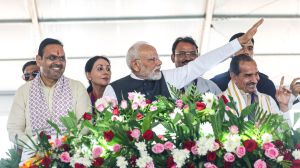Cricket’s Mandela laid to rest
BRIDGETOWN, DECEMBER 14: Conrad Hunte, a West Indies batsman during the 1960s who spent seven years coaching cricket in the black township...

BRIDGETOWN, DECEMBER 14: Conrad Hunte, a West Indies batsman during the 1960s who spent seven years coaching cricket in the black townships of South Africa, was buried yesterday amid praise for his contributions to the game.
Ali Bacher, head of the United Cricket Board of South Africa, called Hunte the “Nelson Mandela of cricket” for his work encouraging black South African youth to excel at a game once dominated in that country by whites.
Bacher called Hunte a visionary whose “presence, example, humility and dedication helped make for a better future for all South Africans.”
Hunte died at age 67 of a heart attack in Sydney on December 3 while attending a conference for moral re-armament, and international human rights movement that he belonged to for almost 40 years.
Hunte played 44 Tests for the West Indies between 1958 and 1968. In 1991, he moved to South Africa and began coaching youth teams in the townships. He returned to Barbados in 1998 and was recently elected president of the BarbadosCricket Association.
Former team-mates, cricket officials and politicians packed into St Michael’s cathedral in Bridgetown for the service. Hunte was then buried at St Andrew’s parish church near Shorey, the village where he was born on Barbados’ east coast.
Hunte was the second of three former West Indian and Barbadian players to die in the space of a month. Former fast bowler and team coach Malcolm Marshall died of colon cancer on November 4 and former fast bowler Sylvester Clarke collapsed and died on December 4, reportedly of diabetic complications.
Clarke will be buried tomorrow.
The deaths shocked the 260,000 inhabitants of this small island-nation to whom cricket is a passion.
Barbados Prime Minister Owen Arthur took part in the service and Peter Chingoka, president of the All-Africa Cricket Association and the Zimbabwe Cricket Union, flew to the Caribbean nation with Bacher to pay their respects.
Hunte’s widow, Patricia, a former television news anchor in Atlanta, Georgia, where thecouple lived for seven years before moving to South Africa in 1991, attended the service with the couple’s three daughters.




- 01
- 02
- 03
- 04
- 05


























